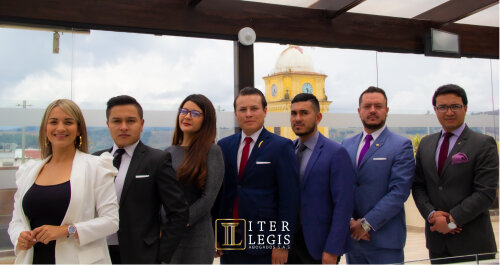Best Native People Lawyers in Tunja
Share your needs with us, get contacted by law firms.
Free. Takes 2 min.
List of the best lawyers in Tunja, Colombia
About Native People Law in Tunja, Colombia
Tunja, situated in the department of Boyacá, is home to several Indigenous communities with deep historical roots in the region. Colombian law recognizes the autonomy, rights, and special legal status of Native People, broadly referred to as “Pueblos Indígenas.” These groups possess ancestral territories and distinct cultural practices that the Colombian Constitution protects. In Tunja and its surrounding areas, the recognition of Indigenous communities includes respect for their traditions, languages, and community governance. The legal framework aims to safeguard their entitlements to land, self-determination, education, and participation in public policy.
Why You May Need a Lawyer
There are various circumstances in which seeking legal advice or representation becomes crucial for Native People in Tunja. Common situations include:
- Defending and formalizing rights to ancestral lands or territories.
- Conflicts over resource use, such as mining or agriculture, on Indigenous territories.
- Ensuring recognition of community authorities and self-governance structures by governmental bodies.
- Addressing discrimination or violation of cultural rights in public or private sectors.
- Securing access to collective health, education, and social welfare programs for Indigenous communities.
- Protecting sacred sites or cultural heritage from urban or commercial development.
- Representing Indigenous individuals in civil, administrative, or criminal matters where cultural context is key.
A specialized lawyer can help navigate complex legal requirements and advocate for Indigenous rights at local and national levels.
Local Laws Overview
Colombia’s legal system recognizes Indigenous rights through several mechanisms at the national and local levels. The 1991 Constitution explicitly protects the cultural identity and autonomy of Indigenous peoples. Additional key points include:
- Indigenous territories (resguardos) have collective property rights and are governed by traditional authorities.
- Local governments are required to consult with Indigenous communities on projects affecting their territories (Prior Consultation Law - Consulta Previa).
- The right to free, prior, and informed consent before the approval of projects impacting their land or culture.
- Traditional justice mechanisms are recognized, provided they do not contravene national laws.
- Special quotas for Indigenous representatives in governmental councils and public policy discussions.
- Legal provisions to protect Indigenous languages, traditions, and access to bilingual education.
Within Tunja, local authorities often work with Indigenous councils to ensure their participation in municipal affairs and development planning.
Frequently Asked Questions
What Indigenous communities exist in Tunja and nearby areas?
Several recognized communities and resguardos are present in Boyacá, including the U’wa and Muisca peoples. Many activities and cultural events in Tunja support these groups.
Are Indigenous land rights recognized in Boyacá?
Yes, Indigenous communities with collective property titles have the legal right to administer and use ancestral territories according to their traditions, subject to national legal limitations.
Can Indigenous authorities exercise their own justice in Tunja?
Traditional authorities may resolve internal disputes according to customary law, provided these processes respect individuals’ fundamental rights and applicable national laws.
What is prior consultation and when is it required?
Prior consultation (consulta previa) mandates the inclusion of Indigenous communities in decision-making about any development project or policy likely to affect their lands or rights. This process must be conducted before project approval.
How can discrimination against Indigenous people be reported?
Acts of discrimination can be reported to local human rights offices, oversight agencies, or specialized Indigenous affairs units within municipal and national government structures.
Are there educational programs for Indigenous youth in Tunja?
Yes, local and national funds support bilingual and intercultural education to preserve Indigenous languages and knowledge, while facilitating access to higher education opportunities.
How are Indigenous health needs addressed?
Special health programs and intercultural services exist to meet unique cultural and health needs, often involving traditional medicine and practitioners under local health policies.
Can Indigenous people participate in local government decisions?
Indigenous representation is guaranteed in municipal councils and special consultation committees. Communities may elect representatives according to their customs.
What legal protections exist for Indigenous women and children?
General and special legal frameworks protect Indigenous women and children from violence, discrimination, and ensure their access to justice and social programs.
What should I do if I believe my or my community’s rights are being violated?
Document the situation, seek guidance from Indigenous authorities or community councils, and consult a legal specialist to explore appropriate legal remedies or protections.
Additional Resources
For assistance and further information regarding Indigenous rights and legal matters in Tunja, consider contacting:
- National Indigenous Organization of Colombia (Organización Nacional Indígena de Colombia - ONIC)
- Ministry of the Interior - Dirección de Asuntos Indígenas, ROM y Minorías
- Defensoría del Pueblo (Ombudsman Office), Boyacá branch
- Municipal Indigenous Councils (Cabildos Indígenas Municipales)
- Legal Aid Clinics at local universities, such as Universidad Pedagógica y Tecnológica de Colombia (UPTC)
- Specialized Indigenous legal defense organizations and NGOs in Colombia
Next Steps
If you or your community require legal assistance on matters related to Indigenous rights in Tunja, consider the following actions:
- Gather all documents and evidence relevant to your situation.
- Meet with your local Indigenous council or authority for preliminary guidance and support.
- Reach out to a lawyer specialized in Indigenous law or human rights.
- Contact relevant government agencies or ombudsman offices for additional support.
- Participate in local consultation meetings and public forums to voice concerns and stay informed about community affairs.
Having knowledgeable legal support is essential for protecting Indigenous rights and ensuring access to justice within the legal framework of Colombia and the local context of Tunja.
Lawzana helps you find the best lawyers and law firms in Tunja through a curated and pre-screened list of qualified legal professionals. Our platform offers rankings and detailed profiles of attorneys and law firms, allowing you to compare based on practice areas, including Native People, experience, and client feedback.
Each profile includes a description of the firm's areas of practice, client reviews, team members and partners, year of establishment, spoken languages, office locations, contact information, social media presence, and any published articles or resources. Most firms on our platform speak English and are experienced in both local and international legal matters.
Get a quote from top-rated law firms in Tunja, Colombia — quickly, securely, and without unnecessary hassle.
Disclaimer:
The information provided on this page is for general informational purposes only and does not constitute legal advice. While we strive to ensure the accuracy and relevance of the content, legal information may change over time, and interpretations of the law can vary. You should always consult with a qualified legal professional for advice specific to your situation.
We disclaim all liability for actions taken or not taken based on the content of this page. If you believe any information is incorrect or outdated, please contact us, and we will review and update it where appropriate.









